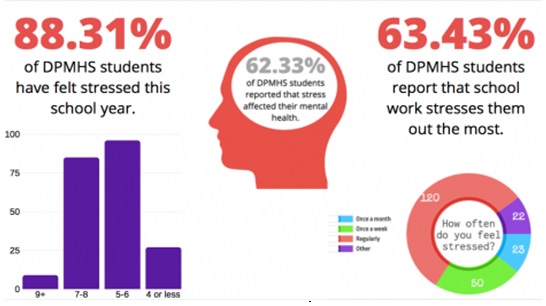
One of the challenges of working with early years students is that they can quickly become overwhelmed by the sheer amount of information they are taking in. The cognitive load is the amount of mental effort required to process information. When the cognitive load is too high, it can lead to errors, confusion, and frustration.
Recently, there’s been a survey organized at Daniel Pearl Magnet High School(DPMHS), and according to that survey 88.31% of young learners feel stressed during the school year and 63.43% of students feel stressed because of school work.

There are a number of strategies to reduce cognitive load on early year’s students. These include using humour, simplifying concepts, using visual aids, and breaking down information into smaller chunks. By using these strategies, you can help your students to better understand and retain the information you are teaching them.
In addition, if you are eyeing to become a more effective early-year educator then we do recommend our Early Years Care and Education Program, which will help you to achieve your teaching goals. Now, let us get to know everything about cognitive load and How you can create effective strategies to reduce cognitive load of your young learners.
The Importance of Reducing Cognitive Load
Reducing the cognitive load on your students is an important part of the learning process. If the cognitive load is too high, students are likely to become overwhelmed and have difficulty grasping and retaining what they are being taught.
Furthermore, high cognitive load can lead to students making mistakes, missing out on important concepts, and becoming frustrated with the learning process. As such, strategies to reduce cognitive load are essential for creating a successful learning environment.
Ways to Reduce Cognitive Load in the Early Years
There are a number of strategies that can be used to reduce the cognitive load placed on early year’s students. These strategies can help to make learning easier and more enjoyable, while also ensuring that students are able to retain the information they are given. Here are some of the ways to reduce cognitive load:
1. Explicit Instruction
Explicit instruction is a technique that involves breaking the material you are presenting into smaller chunks and providing detailed explanations of each step and concept. Explicit instruction can help to reduce cognitive load, as students are given clear guidelines and examples that are easy to follow.
2. Simplify and Organize Information
Simplifying and organizing information is one of the most important strategies to reduce cognitive load for students. Clear, concise explanations, visual aids, and charts can help to make information more readily accessible.
3. Provide Opportunities for Practice
Practice is an important part of the learning process, and it is especially useful for reducing the cognitive load on students. Providing students with opportunities to apply and review the information they have been presented with can help to reinforce and solidify their understanding of the topics.
4. Utilize Visual Cues
Visual cues are a powerful tool for reducing cognitive load, as they provide students with a visual representation of the information they are trying to process. Visual cues can come in the form of diagrams, pictures, and videos, and can help to make complex concepts easier to comprehend.
5. Teacher-Student Interaction
Engaging in dialogue with students is one of the great strategies to reduce cognitive load. Asking questions, providing feedback, and encouraging students to reflect on the material can help to clarify any misunderstandings and foster an understanding of the material.
6. Encourage Student Interaction
Working with peers can help to reduce the cognitive load on students. Students can work together to break down the information and ask questions to gain a better understanding of difficult concepts.
7. Make it Relevant:
Making the information being presented relevant to the student's life can help to reduce the cognitive load on them. By connecting the material to topics that interest students, they will be more engaged and will be more likely to remember what they are learning.
Conclusion:
Reducing the cognitive load on your early year's students is an important part of teaching. By implementing strategies such as explicit instruction, simplifying and organizing information, providing opportunities for practice, utilizing visual cues, facilitating teacher-student interaction, encouraging peer interaction, and making it relevant, you can reduce the cognitive load on your students and create a more successful learning environment.
In case, if you’re an experienced or aspiring early-year educator who’s willing to learn more modern teaching techniques to become the best teacher then we do recommend our Early Years Care and Education Program, which will definitely help you to fulfill your teaching aspiration.